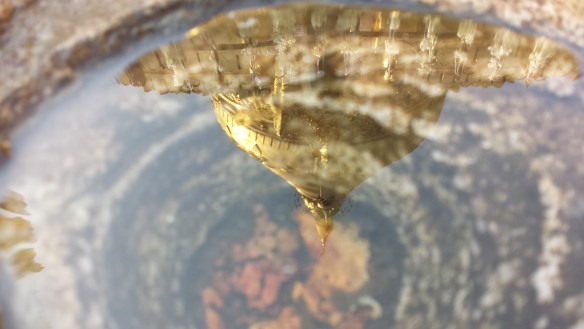It was a long wooden walkway running down over the rocks to it, a dull yellow, low clapboard structure with small rectangular window and an unassuming bland metal chimney on the end, the calm water, ice and endless sky spreading out beyond it as far as she could see. That was their home for the next three weeks.

Category Archives: other places
Anori Outtake: Developing Morning
The sound came up with the morning’s milky grey light – the birds’ songs like half played wooden flutes, a voice from a far-off radio, talking and then in song, the distant chopping of branches and trees and the imagined first hiss of the fire’s first heat, the whirr of a motor, a car or a generator, the cough of a grandmother, the crying baby needing to be fed, the sporadic confused rooster, starting and stopping again. and then the first chants from the pagoda high on the hill – all of these one.
Pictures of Paris with Nani
Davis visited his Nani when he came back from his summer in Paris. She marveled at his pictures, asking again and again where they were from.
“It’s Paris, Nani.” 
“Yes, I was in Paris.”
“Oh, I’ve never been there.”
“You were there on your honeymoon.”
“Oh, I was?”
“Yes, Nani. You’ve been there many times.”
“Oh dear. I don’t remember that at all. I remember nothing.” She bent toward Davis and whispered. “I’m losing my memory.”
“That’s okay, Nani. Don’t worry about it.”
She turned to a picture of Ellen sitting on a tiny balcony with a wrought iron railing. “And who’s this? Is this me?”
“No. that’s Ellen, my girlfriend.”
“Ellen? I don’t know her.”
“She visited in the spring. We live together at school.”
“Oh, I see. She’s very pretty.” She looked at it again. “And where is this?”
“Paris, Nani.”
“Oh.” She turned to the next picture, Ellen completely naked on the bed.
The blood drained from Davis’ face as he reached over involuntarily. He had forgotten to take those ones out.
“Who is that?”
“Well…” He took the stack gently from her and sifted the next three images out – each more graphic than the next – and returned the remainder to his grandmother.
She considered Davis with her drifting, vacant eyes and then squinted at the images in her lap. “What’s this?”
“This is from a boat tour on the Seine.” 
“Paris.”
“You were in Paris?”
“Yes, for a few weeks.”
“I’ve never been there.”
“Yes, you have, Nani. You’ve been there many times.”
“I don’t remember that at all.”
“That’s okay.” He turned to the next picture.
“I have to go to the bathroom.”
Davis nodded. “Okay.”
“You have to help me.”
“I can do that.” He stood. “Ready? One, two, three.” He pulled her up from the couch.
She clung to him a moment, her head against his chest, and then peered into his face. “There’s no dignity in getting old. You just have to forget about that.”
Earth-Out-of-View Phenomenon
At the outset of space exploration in the 1950’s, scientists were concerned about the psychological effects of leaving Earth on astronauts. Initially concerned with various psychoses and anxieties, they have been exceedingly begrudging in allowing the astronaut any sort of autonomy. 


(*Information derived from Mary Roach’s “Packing for Mars”)
72: Gods, Heart Rate and Par
Climb!
Nigel Baines
I couldn’t go in the water. It was too dark. And cold. 
“You have to go in,” the old woman said.
I kept pulling on the rod, moving it in every direction.
“I’ll go.” Nigel Baines stripped down to his underwear and went in, just like that. I watched his legs kicking up as he went down. It took him all of 15 seconds. He was hailed with warm towels and hugs.
“You can have as many grilled cheese sandwiches as you like! You deserve it.”
I was allowed to come too, but I didn’t. I stayed behind and stared into the dark water, that fearful place, and hated Nigel Baines.
Ice Friday: Bauby’s “The Diving Bell”
Jean-Dominique Bauby’s tersely poetic memoir, The Diving Bell and the Butterfly, typed from the blinking of an eye, is harrowing and crystalline clear, moments chronicled by a man on the precipice of death:
I am fading away. Slowly but surely. Like the sailor who watches the home shore gradually disappear, I watch my past recede. My old life spurns within me, but more and more of it is reduced to the ashes of memory. 

Webmaster’s note: As of today, updates for this blog are being switched to a weekly setting, rather than for every post.
Sentimental About Being Alone
I remember the voice rising in sing-song, pausing, starting again, climbing in soft melancholy, conveying the sadness of the world, stopping and starting again.


The Prejudice of Time Zones
It seems to me that to eliminate prejudice, we just have to get rid of time zones. 











